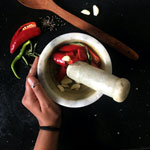International Hot and Spicy Food Day Date in the current year: January 16, 2026
 If you’re one of those people who like it hot (as far as food is concerned), you absolutely should celebrate International Hot and Spicy Food Day. This amazing holiday is observed annually on January 16.
If you’re one of those people who like it hot (as far as food is concerned), you absolutely should celebrate International Hot and Spicy Food Day. This amazing holiday is observed annually on January 16.There are five basic tastes of food: sweet, sour, salty, bitter, and savory (umami). In addition to them, there are other factors that contribute to our perception of food. One of these factors is hotness, also known as heat, spiciness or pungency. It can be described as a tingling or burning sensation caused by presence of certain chemical substances in food. Some people find it unpleasant, while others consider spicy food enjoyable.
Strictly speaking, pungency isn’t a taste because taste is carried from taste receptors to the brain by a different set of nerves than temperature, texture, and pungency. Compounds that stimulate the trigeminal nerve and make food taste pungent include capsaicin from chili peppers, gingerol and shogaol from ginger root, and piperine from black pepper. Mildly pungent foods are sometimes referred to as tangy or piquant. They include, for example, mustard.
The hot sensation provided by spices plays an important role in various cuisines around the globe, especially in equatorial and tropical climates. It makes sense because substances that cause a pungent sensation typically have antimicrobial properties and thus help to keep food from spoiling in hot weather. Cuisines known for their extensive use of spices include Bangladeshi, Burmese, Caribbean, Ethiopian, Filipino, Hungarian, Indian, Indonesian, Jamaican, Korean, Lao, Malaysian, Mexican, Pakistani, Peruvian, Sichuan (Southwest Chinese), Singaporean, Somali, Spanish, Sri Lankan, Thai, Turkish, and Vietnamese.
Spicy food has its pros and cons. Chemical compounds in spices stimulate the digestive tract and speed up the metabolism, have anti-inflammatory and antibacterial properties, and can help you reduce your consumption of salt because spices make food more flavorful. The main downside of spicy foods is that they can cause damage to the mucous membranes in your mouth and stomach, so it’s better to consume spicy foods in moderation. The best way to neutralize the burning sensation caused by spicy food is to drink some milk or have some yogurt with your meal; drinking water can only make it worse.
The origins of International Hot and Spicy Food Day are unclear, but don’t let this keep you from celebrating the holiday and indulging in your favorite hot and spicy dishes. There are plenty of ways to observe Hot and Spicy Food Day. You can go out to your favorite restaurant that serves spicy food and enjoy your favorite dish or try a new one, cook something spicy at home, invite your friends and family over for a potluck meal and ask them to bring a spicy dish along, stock up on hot sauce, or even host a chili pepper-eating contest.
Don’t forget to snap a photo of your favorite spicy dish and share it on social media with the hashtags #InternationalHotAndSpicyFoodDay and #HotAndSpicyFoodDay. By the way, National Quinoa Day is celebrated on the same day, so you can kill two birds with one stone and cook a spicy quinoa salad or bowl to observe both holidays at the same time.
- Category
- International Observances, Unofficial Holidays
- Tags
- International Hot and Spicy Food Day, unofficial holidays, international observances, food days, food holidays